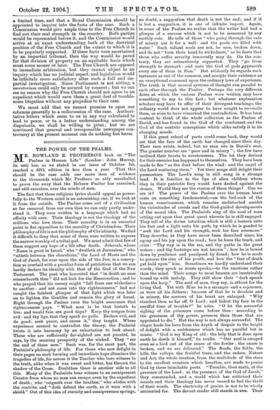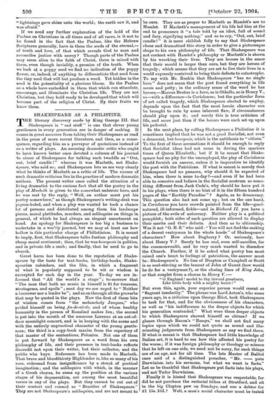M R. ROWLAND E. PROTHERO'S book on "The Psalms in Human
Life" (London : John Murray, 5s. net) has, as we stated in our issue of October 1st, reached a fifth edition in less than a year. That this should be the case adds one more item of evidence to the thousands which Mr. Prothero so ably marshalled to prove the sway that the Hebrew Psalter has exercised, and still exercises, over the minds of men.
The fact that these religious lyrics should appeal so power- fully to the Western mind is an astonishing one, if we look at it from the outside. The Psalms come out of a civilisation so far removed from our own that we can only partly under- stand it. They were written in a language which had no affinity with ours. Their theology is not the theology of the millions who love them. Their morality is in an essential point in flat opposition to the morality of Christendom. Their philosophy of life is not the philosophy of Christianity. We find it difficult to deny that some of them were written to express the narrow worship of a tribal god. We must admit that few of them suggest any hope of a life after death. Jehovah, whose "Name is great in Israel," who " dwelleth at Jerusalem," who "sitteth between the cherubims," the Lord of Hosts and the God of Jacob, for ever upon the side of the Jew, is a concep- tion so overlaid with a peculiar form of patriotism that we can hardly declare its identity with that of the God of the New Testament. The poet who lamented that " in death no man remembereth thee " did not look for the Resurrection ; and he who prayed that his enemy might "fall from one wickedness to another : and not come into thy righteousness," had not caught the faintest glimpse of that light which was later on to lighten the Gentiles and remain the glory of Israel. Right through the Psalms runs the bright assurance that righteousness pays. " What man is he that lusteth to live: and would fain see good days? Keep thy tongue from evil : and thy lips, that they speak no guile. Eschew evil, and do good: seek peace, and ensue it," they taught. Where experience seemed to contradict the theory, the Psalmist twists it into harmony by an exhortation to look ahead. Those who are sufficiently far-sighted are not puzzled, he says, by the seeming prosperity of the wicked. They "see the end of these men." Such was, for the most part, the Psalmist's philosophy of life. For those who now delight in their pages no such burning and immediate hope illumines the tragedies of life, for across it the Teacher who bore witness to the truth, alike when it was sweet and bitter, has thrown the shadow of the Cross. Doubtless there is another side to all this. Many of the Psalmists bear witness to an omnipresent Creator from whom no man can escape, even by the expedient of death ; who "reigneth over the heathen," who abides with the contrite, and " doth defend the earth, as it were with a shield." Out of this idea of eternity and omnipresence springs, no doubt, a suggestion that death is not the end; and if it is but a suggestion, it is one of infinite import. Again, in some of the Psalms we realise that the writer had had a glimpse of a success which is not to be measured by any earthly rule. He tells of those " who going through the vale of misery use it for a well: and the pools are filled with water." Such valiant souls are not, he sees, broken down, and do not "turn their hand to wickedness," as he fears that those who suffer severity innocently may do. On the con- trary, they are miraculously supported. They "go from strength to strength : and unto the God of gods p.ppeareth every one of them in Sion." But evidently he regards such instances as out of the common, and accepts their existence as an exceptional comment upon the ordinary laws of experience. The truth is that several systems of thought run parallel to each other through the Psalter. Perhaps the very different dates at which the various Psalms were written may have something to say to this fact ; but whatever explanation scholars may have to offer of their divergent teachings, the ordinary world does not appear to have sought to reconcile them, or even to have remarked the contradiction. It has been content to think of the whole collection as the Psalms of David, and has found in the God of the combatant and the God of the contrite conceptions which alike satisfy it in its changing moods.
If this great school of poets could come back, they would see that the face of the earth has changed since their day. Their race exists, indeed, but no man sits in David's seat. The greater number are " poor and in misery " ; the few have inclined their hearts to covetousness. The lot they desired for their enemies has happened to themselves. They have been made to flee " as the dust before the wind : and the angel of the Lord scattering them." Yet their songs still delight their persecutors. The Lord's song is still sung in a strange land. It is familiar to the lips of alien children whom they in their patriotic fury would have dashed against the stones. Would they see the reason of these things ? Can we see it? The power of the Psalms over the human heart rests on something fundamental,—on the bed-rock of the human consciousness, which remains undisturbed amidst the vicissitudes of creeds and the God-guided developments of the moral idea. The Psalmists sing of the soul of man setting out upon that great quest wherein he is still engaged. They tell of the divine intuition which is still a lantern unto his feet and a light 'unto his path, by which he is goaded to " seek the Lord and his strength, seek his face evermore." They describe, as they have never been described since, his agony and his joy upon the road ; how he loses the track, and cries : " Thy way is in the sea, and thy paths in the great waters : and thy footsteps are not known "; how he is bowed down by penitence and paralysed by dread ; how he is made to possess the sins of his youth, and how the "fear of death gat hold upon" him. Sometimes we hardly understand their words ; they speak as music speaks,—to the emotions rather than the mind. Their songs to most hearers are inextricably bound up with melody. They still show their " dark speech upon the harp." The soul of man, they say, is athirst for the living God. Yet with Him he is a stranger and a sojourner, as were all his fathers ; because of that he is desolate and in misery, the sorrows of his heart are enlarged. " Why standest thou so far off, 0 Lord : and hidest thy face in the needful time of trouble ?" he cries. " 0 let the sorrowful sighing of the prisoners come before thee : according to the greatness of thy power, preserve thou those that are appointed to die." But the way is not always sorrowful. The singer leads his hero from the depth of despair to the height of delight with a suddenness which has no parallel but in music. " God is my King of old : the help that is done upon earth he doeth it himself," he exults. " Our soul is escaped even as a bird out of the snare of the fowler : the snare is broken, and we are delivered." The floods, the fields, the hills, the valleys, the fruitful trees, and the cedars, Nature and Art, the whole creation, from the multitude of the stars to the smallest creature which breathes, are made to praise God by these inimitable poets. " Tremble, thou earth, at the presence of the Lord : at the presence of the God of Jacob," they commanded, and a world which has criticised their morals and their theology has never ceased to feel the thrill of their words. The electricity of genius is not to be wholly accounted for. The devout reader still stands in awe. Their If we need any further explanation of the hold of the Psalms on Christians in all times and of all races, is it not to be found in the fact that the Psalms, like the Hebrew Scriptures generally, have in them the seeds of the eternal,— of truth and love, of that which reveals God to man and reconciles justice with mercy? Though parts of the Psalms may seem alien to the faith of Christ, there is mixed with them, even though invisibly, a promise of the truth. When we look 4 a poppy seed we find no indication of the poppy flower, or, indeed, of anything to differentiate that seed from the tiny seed that will but produce a weed. Yet hidden in the seed is the potentiality of a glorious bloom. So the Psalms as a whole have embedded in them that which can stimulate, encourage, and illuminate the Christian life. They are not Christian, but they hold ready to be developed that which will become part of the religion of Christ. By their fruits we know them.
SHAKESPEARE AS A PHILISTINE.











































 Previous page
Previous page